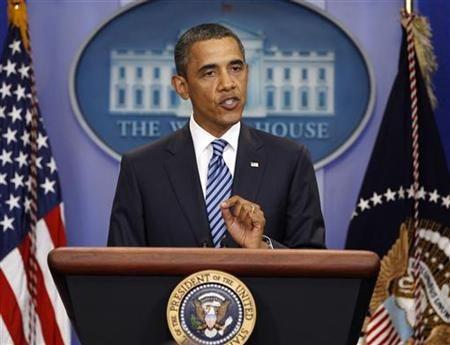Debt Talks: Obama Open to Social Security, Medicare Cuts

President Barack Obama has shifted his strategy in debt talks with Republicans, offering a substantially larger deficit reduction package that would include cuts to Medicare and Social Security in exchange for eliminating tax breaks.
The proposal aims to satisfy both sides by enacting broad long-term cuts to entitlement programs, a priority for Republicans, and by seeking new sources of revenue through eliminating tax breaks for corporations and the wealthy, a measure backed by Democrats and unequivocally opposed by Republicans. But Obama also appears to be calculating that the time is right to push for an ambitious economic plan that capitalizes on the intense debate galvanizing Congress.
Obviously, there will be some Democrats who don't believe we need to do entitlement reform. But there seems to be some hunger to do something of some significance, a Democratic official familiar with the administration's thinking told The Washington Post. These moments come along at most once a decade. And it would be a real mistake if we let it pass us by.
In previous weeks, both sides had agreed upon a target of $2 trillion in cutbacks to offset raising the nation's debt limit by roughly the same amount. But Obama is asking for potentially twice that amount, emboldened by a weekend meeting in which Speaker of the House John Boehner, R-Ohio, acceded to as much as $1 trillion in new revenue through tax reform in exchange for substantial cuts to formerly untouchable programs like Social Security, Medicare and Medicaid.
Such a compromise could be hard sell to the rank and file of both parties. Republicans have doubled down on their opposition to any form of tax increase, encouraged by the unwavering fiscal austerity pushed by its Tea Party wing. Democrats have argued that the relentless focus on cutting spending has eviscerated programs for vulnerable Americans while sparing the rich, and have vowed to protect programs like Social Security and Medicare. The party has rallied around denouncing U.S. Rep. Paul Ryan, R-Wis., plan to restructure Medicare, portraying themselves to voters as the alternative to Republican attempts to pare back the program. Agreeing to Medicare cuts could capitulate that point.
Depending on what they decide to recommend, they may not have Democrats, U.S. Senator Sheldon Whitehouse, a Rhode Island Democrat, told the New York Times. I think it is a risky thing for the White House to basically take the bet that we can be presented with something at the last minute and we will go for it.
The question of new tax revenues, an intractable one so far, is also likely to play a role. U.S. Rep. Eric Cantor, R-Va., who dropped out of the negotiations because of Democratic insistence on new sources of revenue, reiterated his rejection of any proposal that increases taxes. Democrats have pushed Obama to let tax cuts on the nation's highest earners expire, a measure that could be included in Obama's proposal.
But U.S. Sen. Dick Durbin, D-Ill. signaled that Democrats could be willing to pursue a larger vision.
We don't need a minideal, Durbin of Illinois said Wednesday on the Senate floor. We need something that speaks authoritatively to the world that the United States understands its deficit challenge and is prepared to make the hard choices to address it.
© Copyright IBTimes 2024. All rights reserved.





















